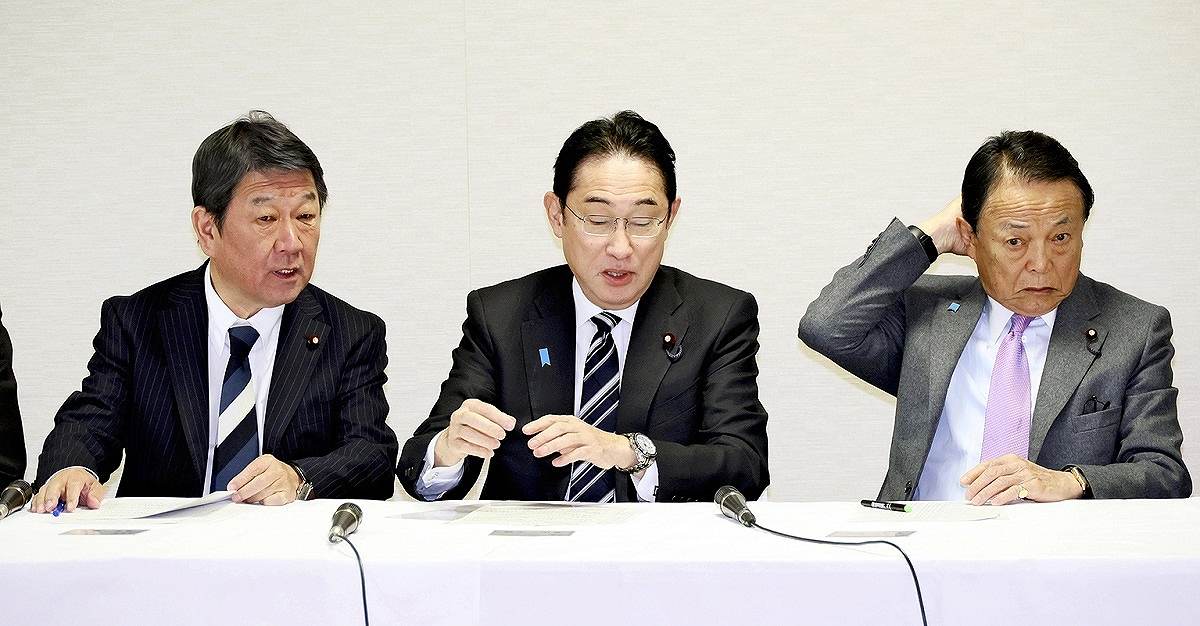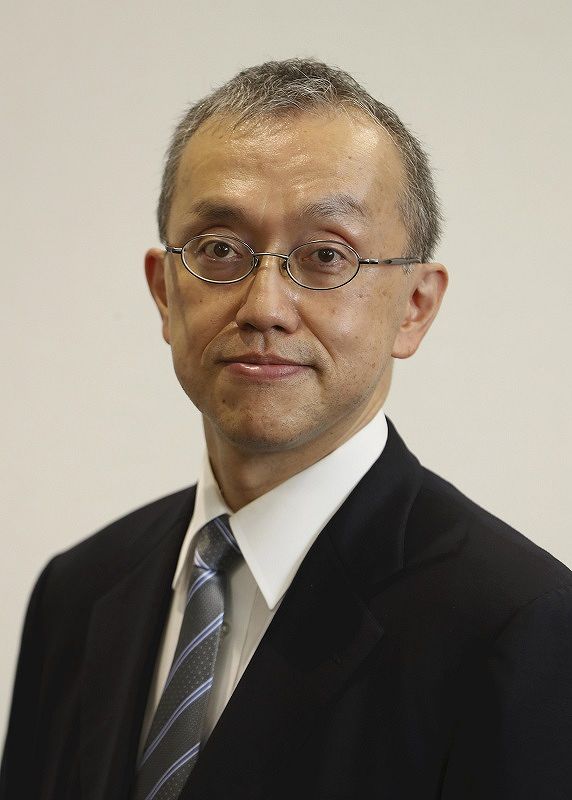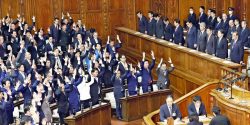
Prime Minister Fumio Kishida, center, attends a meeting of LDP executives on Dec. 19.
8:00 JST, December 30, 2023
When we look back over the past month, it is astonishing how drastically the situation surrounding Prime Minister Fumio Kishida and the ruling Liberal Democratic Party has changed.
Just half a year ago, Kishida was enjoying great success as the host of the Group of Seven summit in Hiroshima, where his constituency is located. He boasted a stable support base and high popularity. But now, the LDP has been backed into a corner because of issues of “politics and money.” Kishida’s administration is in turmoil.
Kishida has replaced some ministers who are alleged to have engaged in illegal conduct. His administration and the LDP are mired in extremely low popularity. The opposition parties and other critics are demanding that Kishida dissolve the House of Representatives and hold a general election as soon as possible, which could cause a landslide defeat for the LDP and, therefore, a change of power.
I expect this cannot be remedied quickly. Unfortunately, there is no reliable opposition party at present that has sufficient capacity and human resources to govern. If we have an election, no one knows which party will hold power, who will become the successor to Kishida, or even whether a new administration can perform adequately. However, Kishida is unlikely to dissolve the Diet because it would surely lead to his resignation.
The political confusion may linger for some months. So, the start of the new year is a good chance for us to think about the causes of the many failures of the LDP and ways to improve them.
First, we need to acknowledge the problem of “politics and money,” which has deeply contaminated the LDP for a long time. More than 20 years ago, bribery cases occurred very often. In the past 10 years, more than a few politicians have committed criminal acts through their sloppy handling of political funds. With a few exceptions, almost all of them were LDP members.
Now, prosecutors are investigating — and will decide whether or not to charge — members of the Abe faction, the LDP’s largest faction, which was once led by former Prime Minister Shinzo Abe, who was assassinated last year. The members are facing allegations of the misuse of political funds. Those who have created hidden funds, called “uragane” in Japanese, include not only powerful politicians but also many rank-and-file Diet members. The investigation of these allegations may widen to the entire LDP.
Political fund reports by the Ministry of Internal Affairs show that the LDP and large opposition parties are financially dependent on the state. Parties other than the Japanese Communist Party get more than ¥30 billion yen (about $210 million) in total as subsidies from state coffers per year.
Such subsidies account for more than 60% of the total revenue of the LDP. For the Constitutional Democratic Party of Japan, the largest opposition party, and Nippon Ishin (Japan Innovation Party), the second largest, subsidies are an even larger portion of their total revenue.
The LDP has local organizations on a large scale, and its Diet members have many more secretaries than members of the opposition parties. The LDP cannot cover all of its expenses without collecting political donations or selling political fundraising party tickets, which is a system little-known to the average Japanese voter. So, big corporations, industry organizations like those representing automobile manufacturers, or professional associations such as those representing doctors have mainly supported the LDP and its members. For such companies and organizations, the opposition seems to have only a slight chance of taking power or shaping policies that would affect their businesses.
It would not be correct to criticize lawmakers for not doing anything. Whenever allegations of the misuse of political funds have emerged, the Diet has tried to tighten restrictions or step up the transparency of income and expenditures. But owing to objections from the LDP, it has been hard to reach an agreement for workable rules. In the next Diet session, the ruling and opposition parties will tackle revising the Political Funds Control Law, but the results will probably leave many loopholes and make the law even more complicated.
These scandals have a few lessons to teach the LDP.
For example, before ministers from the Abe faction were dismissed, they had stated repeatedly that, in their roles as government officials, they would refrain from commenting on the issue at press conferences and in Diet committees. Not only ministers, but all the Diet members who are alleged to have committed improprieties have evaded their responsibility for explaining themselves.
When the scandal surfaced some months ago, the LDP could have investigated the matter by itself and demonstrated accountability. But it lost the chance to do so.
Even though these scandals seem to be due to delinquency in the observance of rules rather than greed, a severe problem is that no one in the LDP appeared to think of stopping the widespread wrongdoing. Why did no one prevent others from violating the law?
Some pundits may point out a lack of diversity in the LDP as a contributing cause of the scandal, meaning the low representation of women and members of younger generations, with particular attention on the so-called hereditary seats that are dominant within the party. This old-fashioned situation might have created the tendency for members to go along with the majority and to never express skepticism.
You might be surprised at how many famous Diet members have been from political families. Kishida’s father was a former minister and a key figure in the LDP, and Kishida belonged to the same faction as his father. His grandfather, too, was a Diet member before and after World War II.
Former prime ministers such as Shinzo Abe, Japan’s longest-serving prime minister, Taro Aso, now the vice president of the LDP, and Junichiro Koizumi, who was immensely popular while in office, were all members of at least the third straight political generation of their families.
A politician who steps into his or her father’s job can easily win a Diet seat at an early age. This is a great advantage in a party that has a seniority system based on the number of terms served. It is said that nearly a third of LDP members in the House of Representatives are from political families.
Will the LDP try to change this deeply rooted culture and commit itself to self-improvement? If not, the new year will be very bleak for them.
Political Pulse appears every Saturday.

Takayuki Tanaka
Takayuki Tanaka is senior managing director, chief officer, administration, of The Yomiuri Shimbun. His previous post was managing editor.
Top Articles in Editorial & Columns
-

40 Million Foreign Visitors to Japan: Urgent Measures Should Be Implemented to Tackle Overtourism
-

University of Tokyo Professor Arrested: Serious Lack of Ethical Sense, Failure of Institutional Governance
-

Policy Measures on Foreign Nationals: How Should Stricter Regulations and Coexistence Be Balanced?
-

China Provoked Takaichi into Risky Move of Dissolving House of Representatives, But It’s a Gamble She Just Might Win
-

PM Takaichi Should Help Young Japanese Break Seniority Barrier to Vitalize Politics
JN ACCESS RANKING
-

Japan Institute to Use Domestic Commercial Optical Lattice Clock to Set Japan Standard Time
-

Israeli Ambassador to Japan Speaks about Japan’s Role in the Reconstruction of Gaza
-

Man Infected with Measles May Have Come in Contact with Many People in Tokyo, Went to Store, Restaurant Around When Symptoms Emerged
-

Prudential Life Insurance Plans to Fully Compensate for Damages Caused by Fraudulent Actions Without Waiting for Third-Party Committee Review
-

Woman with Measles Visited Hospital in Tokyo Multiple Times Before Being Diagnosed with Disease




















